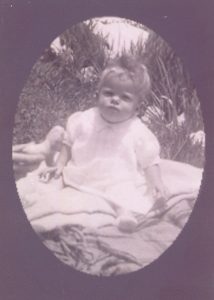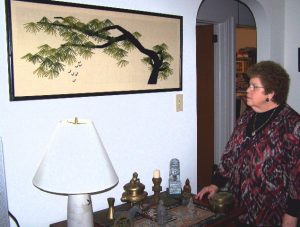Resident Born in Japanese Internment Camp

Cornwall Manor resident Sally Renda wasn’t alive when the Japanese attacked Pearl Harbor on December 7, 1941. However, the war that followed this catastrophic event ultimately changed her life.
Her parents, William and Edith Mather and grandparents were Presbyterian missionaries in training in China. In an effort to try and escape the escalating tension between China and Japan, they moved to Baguio in the Philippines. By the time her family learned that Pearl Harbor was bombed and the danger they were in, it was too late to get to safety.
By the end of December 1941, all Americans were ordered by the Japanese to register and were placed in Camp John Hay – an internment camp. At the same time, Edith was nine months pregnant and gave birth to Sally two days later on January 1, 1942. Camp John Hay, a former American military base that was bombed by 18 Japanese planes on the first day of the war, did not provide adequate housing for the 1,000 people living in the camp. Four months later, the “prisoners” were moved to Camp Holmes which was in better shape and larger. Camp Holmes was a former Filipino military camp and the internees resided there until December 1944.
Life in an internment camp was organized and often run by the Americans. The first year and a half at Camp Holmes was pleasant according to Sally. The Japanese commandant treated the internees well and allowed freedom in the camp. In an attempt to pass the time and keep life as normal as possible, recreational and sports activities, a school and chores were established. Men and women lived in separate dormitories, but were able to interact during the day.

Life began to drastically change by December 1943. A different commandant took over the internment camps because two prisoners had escaped. The rules became more restrictive and food dwindled. A year later, the internees were moved to Manila. This was a very old, condemned prison that also housed other prisoners of war. Contagious disease, starvation and the Battle of Manila made this time the worst. By February 1945, the Battle of Manila began and Sally recalls the bombing being so loud that it hurt her ears. When American forces entered the prison to rescue POWs, they did not know they would also rescue the group of internees also in the prison.
The American soldiers cared for the POWs and internees in the prison for another month until the Battle of Manila ended and transportation was available. After being liberated, Sally and her family took a boat back to the West Coast and eventually relocated to Princeton, NJ. Since moving to Cornwall Manor in 2008, Sally spends time researching and learning more about this traumatic time of her life. Being a child when this portion of her life took place, she feels fortunate that she doesn’t remember the majority of time she spent in Japanese internment camps. Sally feels lucky to be alive and has a special appreciation for her freedom.

